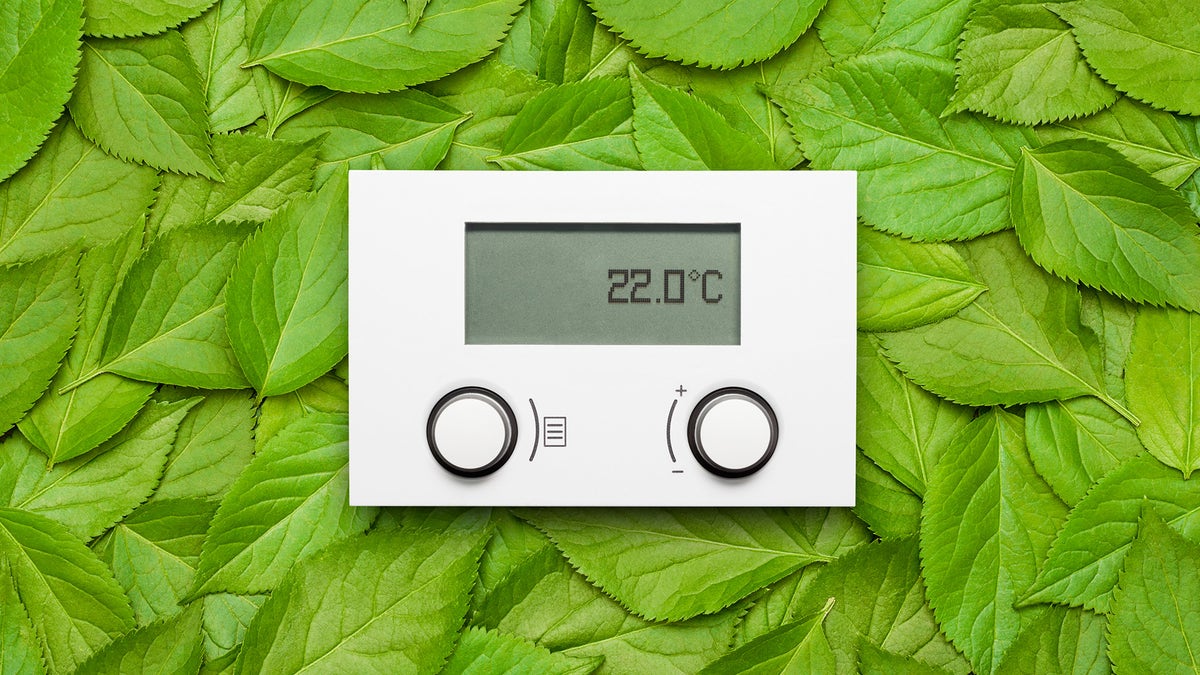
Electronic thermostat on leaves ((c) Jorg Greuel)
Renters, it's time to green up your act!
We can all take steps to protect our planet, but apartment dwellers often don't go beyond recycling. Perhaps you feel you don't have a long-term stake in your home or a homeowner's budget for sustainability features.
But there are some easy tricks you can use to help save resources -- including money! Check these out.
1. Practice better climate control
Heating and cooling typically amounts to 50% or more of your energy bill. Even if utilities are included in your rent, do the right thing and moderate the thermostat whenever possible. Andrea K. George, director of the Sustainability and Environmental Management Office at Vanderbilt University, suggests a setting of 76 to 78 degrees in warm weather and 68 degrees in cold weather.
Also, ask your landlord if you can change out a traditional thermostat with a programmable type that you can manage remotely.
2. Don't forget those other two R's
If you're like most apartment dwellers, storage space is always an issue -- especially when you're always tempted to buy even more stuff! (C'mon, you know who you are.) But one of the quickest ways to be environmentally conscious is to follow the hierarchy: reduce, reuse, recycle.
"So many people just skip right to recycle and think if they are recycling, then they are doing all they can for the environment, but that is so not true," George says. "The first thought should always be to reduce. Do I really need whatever it is I am considering buying or eating?"
Also, think about what you can reuse. Reusable coffee cups and water bottles make a huge difference in garbage volume. On a larger scale, get your furnishings at resale stores or through Craigslist or freecycle.org (a network for people giving and getting good stuff for free to keep it out of the landfills).
"Any time you reuse something, it saves enormous resources in production, shipping/transportation, et cetera," George says.
3. Watch the waterworks
According to the United States Geological Survey Water Science School, 4,000 drips from a leaky faucet equals about 1 liter of wasted water. You can calculate your personal "drip" potential here.
Fortunately, there is an easy fix -- changing the washers on your faucet(s). Talk to your superintendent about doing it, or check out this how-to video.
Another wise way to save water? Replace your showerheads with low-flow alternatives. By installing an EPA-approved WaterSense showerhead, the average family can save 2,900 gallons of water annually, not to mention saving on energy by heating less water.
Or you could try taking shorter showers. George suggests setting a timer and gradually reducing your shower time. Also, turn off the sink while you shave or brush your teeth.
After all, every little drop counts.
4. Get rid of the energy vampires
Are you ready to see the light … with energy conservation? You should be, because 25% of your home utility bill is usually related to lighting, George says.
So pay attention to your lightbulbs! Renters can quickly lessen their energy usage just by choosing the right illumination.
Energy Star -- rated compact fluorescent lights use 75% less energy than incandescent and last six t0 10 times longer -- 8,000 hours versus 1,200 hours, George says. Light-emitting diodes are even better, lasting 25% longer than the incandescent bulbs we are all used to -- 25,000 hours versus 1,200 hours -- and use 80% less energy.
While these bulbs cost more upfront, they'll save you money in the long run. Also, try to use natural light whenever possible.
Another massive drain? Leaving your electronics charging after they're fully juiced. "Vampire" loads can account for up to 10% of your energy usage, George says. To reduce this, just unplug your computers, cellphone chargers, game systems, and other electronics when they're not being used.
Keeping an empty charger plugged in is also not optimal. Studies from the University of California, Berkeley, indicate that cellphone chargers in this state consume an estimated $4 billion in energy annually.
5. Create a green team
One of the best ways to put green practices into play is to make it a group effort, says Myria Allen, professor of communication at the University of Arkansas in Fayetteville and author of " Strategic Communications for Sustainable Organizations."
Allen -- who works with companies to help them become more environmentally aware -- suggests the first place to start is in your own apartment. That means recruiting family members and/or roommates to jump on the bandwagon.
"Perhaps start a jar where if someone in your home sees that you leave your cellphone charged all night you are fined a quarter. … Same thing applies for leaving lights on in an empty room and so on," Allen says.
At the end of the month, the funds collected can be used to invest in even more ecologically sound items for your apartment -- like power strips or LED lightbulbs.
Another idea? See if you can start a "Green Team" within your apartment complex -- try posting in the laundry room or chatting with neighbors. Then you can approach management as a united front about making your building more sustainable -- which will pay off for them, too.
"Use a business case for sustainability arguments," Allen says. "More effective energy/water use can be used as a selling point to new tenants, or new tenants are attracted to buildings where residents share a concern for the environment."
With a little creativity and awareness, you, too, can find yourself thinking green and saving green!